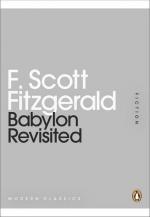|
This section contains 866 words (approx. 3 pages at 300 words per page) |

|
SOURCE: "Fitzgerald's 'Babylon Revisited'," in The Explicator, Vol. 16, No. 4, January, 1958, pp. 1, 3.
In the following essay, Harrison asserts that although Charlie Wales has begun to mature, he is still drawn to his former life.
The usual interpretation of F. Scott Fitzgerald's "Babylon Revisited" has been summarized by Ray B. West (The Short Story in America, 1952). Charlie Wales, returning to Paris, "accidentally becomes involved with some of his old friends; and despite his present dislike of the old life—his knowledge that . . . it was something he had to escape if possible, not recover—he appears to have succumbed and thus loses, once and for all, the hope of regaining his child. The pathos in 'Babylon Revisited' is deepend and enriched by Charlie Wales's recognition that he is, in part at least, merely reaping the harvest of his earlier years. . . . [He is] doomed because he still carries the burden of...
|
This section contains 866 words (approx. 3 pages at 300 words per page) |

|


